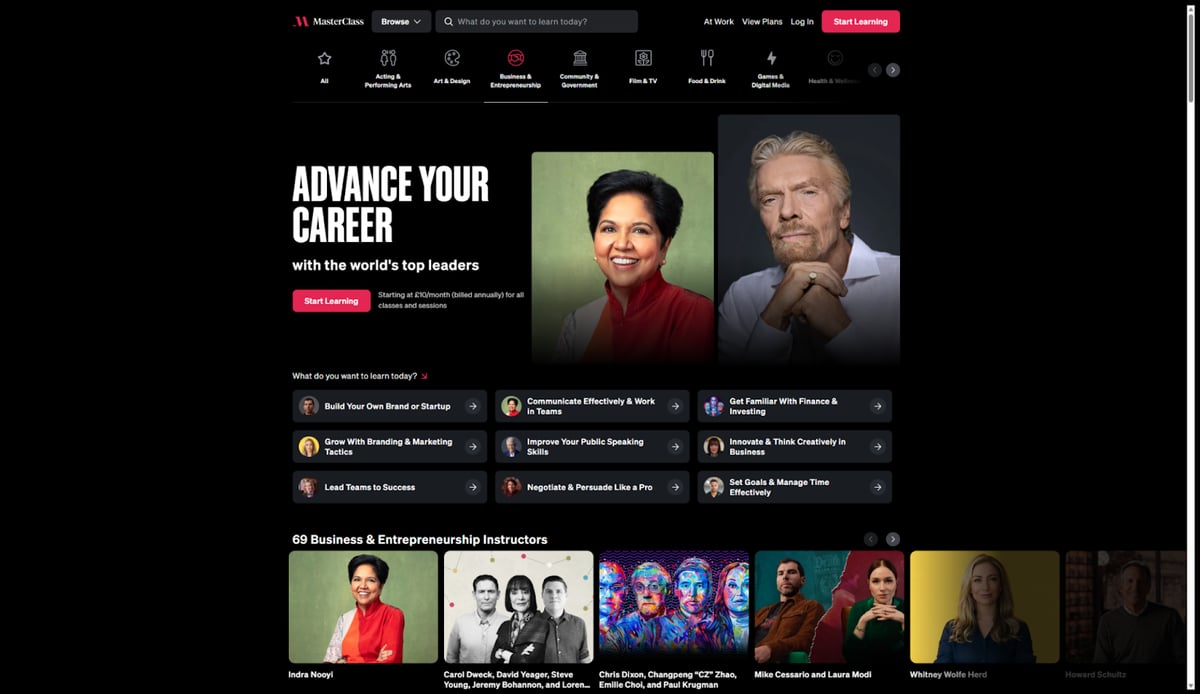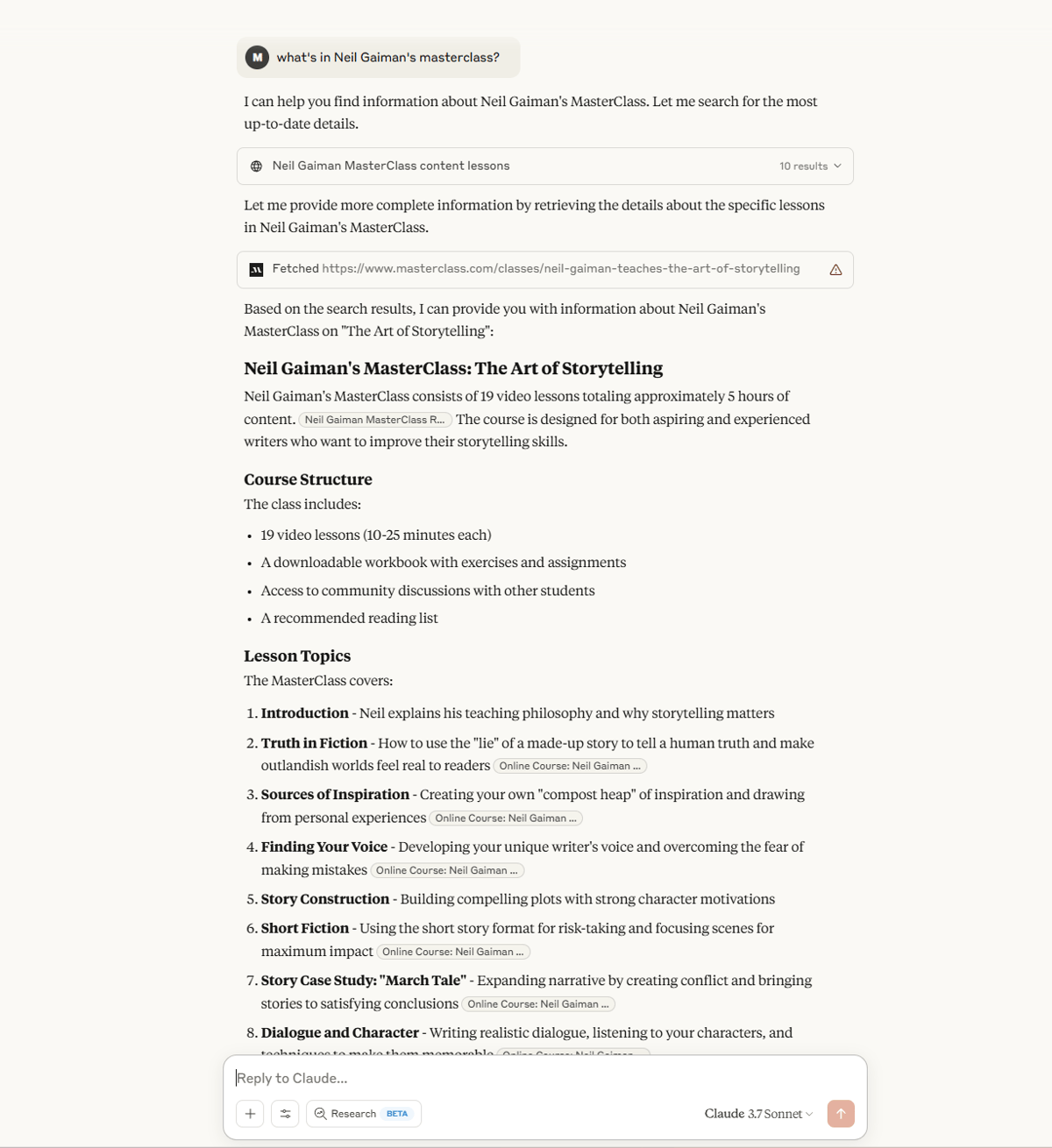The MasterClass learning platform comes up for most searches for online learning and skill-building.
Priding itself on a large collection of celebrity-endorsed micro-courses from famous people who walk the walk, it’s clear why you’d be drawn to such a platform. From the perspective of these individuals, there are few places to get such unique insight into the lives and workflows of these people who “made it”.
There’s something for everyone, from writing and photography to leadership and persuasion.
But here's the million-dollar question every tech professional should ask: Is MasterClass worth it for advancing your tech career?
I’ve been a member for two separate years with a gap of about a year and a bit in between, as well as having deep-dived many user experiences, analyzed course content, and compared alternatives, all to give you a straight answer.
There are certainly pros and cons, and it’s not for everyone, so to help you make the right choice, here’s what you need to know.
What MasterClass actually delivers for modern professionals

Let's start with what MasterClass isn't: it's not going to teach you React, explain distributed systems, or help you crack coding interviews.
MasterClass is a subscription-based online learning platform ($120-$240/year) featuring high-production-value video courses taught by recognized experts across various fields.
Instead, MasterClass offers something different—access to the mindsets and approaches of world-class leaders, communicators, and innovators. For tech professionals, the most relevant courses include:
Leadership and strategic thinking
- Bob Iger on Business Strategy (consistently rated as most valuable for tech leaders)
- Howard Schultz on Business Leadership
- Chris Voss (a former FBI lead hostage negotiator) on Negotiation
Communication and presentation
- Neil deGrasse Tyson on Scientific Thinking and Communication (particularly popular among data scientists and engineers)
- Neil deGrasse Tyson's Scientific Thinking course is frequently mentioned as valuable
Creative Problem-Solving
- Will Wright (SimCity creator) on Game Design
- Various creativity-focused courses that inspire fresh approaches to technical challenges
While these sound interesting, the platform’s strength lies in its cinematic production quality and storytelling approach. Unlike technical tutorials, MasterClass courses focus on principles, mindset, and strategic thinking.
That said, the information is, to some users, negligible. There are a few hidden gems of information and advice on these topics you won’t typically find elsewhere. It’s also good to have it all in one place by the person who’s actually walked the walk.
However, there’s a ton of information you can find elsewhere, even for free on the MasterClass blog itself, meaning in some instances, it’s not really a worthwhile investment.
Interestingly, and I ran this as an experiment writing this post, I tried asking Claude AI what was involved in a specific MasterClass I’ve already done. It was correct, and when asked to elaborate, it did so quite accurately.
Just saying.

Why this matters for your career (and why it doesn't)
Win Big in Business with Mark Cuban | Official Trailer | MasterClass
Again, while MasterClass won’t teach you to code, it does have a lot of focus on building a business, growing a startup, bettering your communication, or becoming a great leader.
There are 69 multi-episode classes in the business category, led by the likes of Richard Branson, Mark Cuban, Indra Nooyi, and more.
And these are good skills to have, especially given the insight of world industry leaders who actually run companies.
Research shows that leadership values these skills highly, with 55% of leaders rating problem-solving and critical thinking as most important for IT professionals, followed by adaptability (52%) and effective communication (40%).
One Deloitte survey found that 87% of employees believe skills like adaptability, leadership, and communication are key to advancing at work.
The tech industry has a dirty little secret: 70% of corporate leaders report critical skills gaps limiting innovation and growth. These aren't technical gaps—companies can hire for those.
These soft skills determine whether you'll remain an individual contributor forever or eventually lead teams and shape product strategy.
MasterClass addresses some of these challenges better than others. Its greatest strength lies in supporting the technical-to-leadership transition and developing cross-functional communication skills—areas where many technical education platforms fall short.
Where MasterClass shines:
- Developing leadership presence and strategic thinking
- Learning to communicate technical concepts to non-technical audiences
- Gaining cross-disciplinary perspectives that inspire innovation
- Building confidence in high-stakes situations (negotiations, presentations)
Where it falls short:
- Zero technical depth or hands-on practice
- No industry-recognized certifications
- Limited tech-specific context
- Minimal peer interaction or networking opportunities
Long story short, if you’re looking for a way to build specific skills from authorized, credible sources, MasterClass shines, but this is really a very personal and hyper-focused approach.
It’s great for casual learning and for embracing in your own time, but if you’re looking for more real-world experience, you’ll want something a little more comprehensive.
Platform showdown: Where MasterClass stands against the giants
E-learning in the way MasterClass offers is nothing new, especially when plenty of platforms provide something similar in their own way.
Since you’re investing time and money, you need to know you’re directing your efforts in the right place, so let’s check out what else is out there and how MasterClass compares.

The smart play? Most successful tech professionals don't choose one platform—they build a portfolio:
- Primary technical learning: Pluralsight or Coursera for deep technical skills
- Soft skills and leadership: MasterClass for inspiration and mindset development
- Networking and professional development: LinkedIn Learning
- Specific technologies: Udemy for targeted skills
Where MasterClass makes sense for modern professionals
Software Developers/Engineers
- Early career (0-3 years): Limited direct value. Focus on Pluralsight/Coursera first.
- Mid-career (4-7 years): Growing value for communication and leadership foundations.
- Senior level (8+ years): High value for strategic thinking and cross-functional collaboration.
Product Managers
- High value across all career stages. Bob Iger's leadership course and Chris Voss's negotiation tactics directly apply to stakeholder management and product strategy.
UX/UI Designers
- Moderate to high value. Cross-disciplinary creative courses provide fresh perspectives that purely design-focused platforms might miss.
Data Scientists
- Moderate value. Neil deGrasse Tyson's scientific communication course helps present findings to non-technical stakeholders.
Technical Leaders and Managers
- Highest ROI. Leadership, communication, and negotiation courses directly address daily challenges in managing technical teams and interfacing with business stakeholders.
As one software developer shared on Reddit: "I enjoy MasterClass but would never recommend it as a primary learning resource for coding or technical skills. It's a supplement at best, not a replacement for platforms like Pluralsight."
The networking reality: MasterClass's biggest weakness

Let's address the elephant in the room. Networking and community engagement are increasingly critical for tech career advancement, but this is an area where MasterClass falls short compared to alternatives:
MasterClass Limitations:
- Minimal peer interaction beyond basic discussion forums
- No tech-specific community features
- Zero direct instructor access
- No job marketplace or career services integration
Better Alternatives for Tech Networking:
- GitHub community engagement and open source contributions
- Stack Overflow participation and reputation building
- Technical meetups and conferences (local and virtual)
- Professional organizations (ACM, IEEE)
- LinkedIn groups and active professional posting
- Company-sponsored hackathons and tech talks
If networking and community are priorities, allocate your budget toward platforms and events that offer these opportunities rather than expecting them from MasterClass.
Making the call: Is MasterClass worth it for you?
Here's a practical framework for deciding:
MasterClass makes sense when:
✅ You're transitioning from technical IC to leadership roles
✅ You struggle with stakeholder communication and presentations✅ You have solid technical foundations and need complementary skills
✅ You're in product, design, or management roles requiring vision and strategy
✅ You value high-quality, engaging content that keeps you motivated
✅ You can afford it as part of a broader learning portfolio (not your only resource)
Skip MasterClass when:
❌ You're early career and still building core technical skills
❌ Your primary goal is hands-on technical specialization
❌ You need industry-recognized certifications for career advancement
❌ You're on a tight learning budget and must prioritize technical skills
❌ You prefer community-driven learning and peer interaction
The sweet spot approach: Most successful tech professionals use MasterClass as one component of a comprehensive learning strategy.
- 60-70% of learning budget: Technical platforms (Pluralsight, Coursera)
- 20-30%: Leadership and soft skills (MasterClass, specialized workshops)
- 10-20%: Networking and community engagement
How to build a learning strategy that works
Ready to make an informed decision? Here's your action plan:
1. Assess your current state
- Where are you in your tech career progression?
- What's holding you back from your next career goal?
- Do you have strong technical foundations already?
2. Identify your skills gap
- Technical depth vs. leadership/communication skills
- Specific technologies vs. strategic thinking
- Hands-on practice vs. mindset development
3. Set learning priorities
- What will create the most career impact in the next 12 months?
- Which skills are immediately applicable to your current role?
- What's your realistic learning time budget per week?
4. Try before you commit
- Use MasterClass's 30-day guarantee to test the platform
- Take advantage of free trials on technical platforms
- Attend free webinars and meetups to gauge networking value
5. Create your learning portfolio
- Primary platform for technical skills (likely not MasterClass)
- Secondary resource for leadership/soft skills (potentially MasterClass)
- Community engagement strategy (definitely not MasterClass)
- Budget allocation across different learning modalities
6. Measure and adjust
- Set specific, measurable learning goals
- Track application of new skills in your work
- Adjust your portfolio based on career progression and feedback
Wrapping up
Let's be real: MasterClass delivers Hollywood-quality content from industry icons, but lacks what tech careers truly need—personalization and application.
For senior devs eyeing management or product managers refining strategy, it offers a valuable perspective—but misses the crucial element of guidance tailored to your specific context.
This is where MentorCruise changes the game.
Instead of one-size-fits-all videos, it connects you with tech leaders from Amazon, Microsoft, and Meta who've navigated your exact path. These aren't recorded celebrities—they're active engineering managers and CTOs providing feedback on your specific challenges.
Elite tech professionals don't just consume content—they build relationships with mentors who spot their blind spots, critique their approach, and open doors no course can provide.
MasterClass might inspire you, but MentorCruise will transform you through personalized guidance that adapts to your challenges and holds you accountable.
Your career deserves more than polished videos—it deserves investment in relationships that directly accelerate your next move.
Check out Mentorcruise today to get started.







